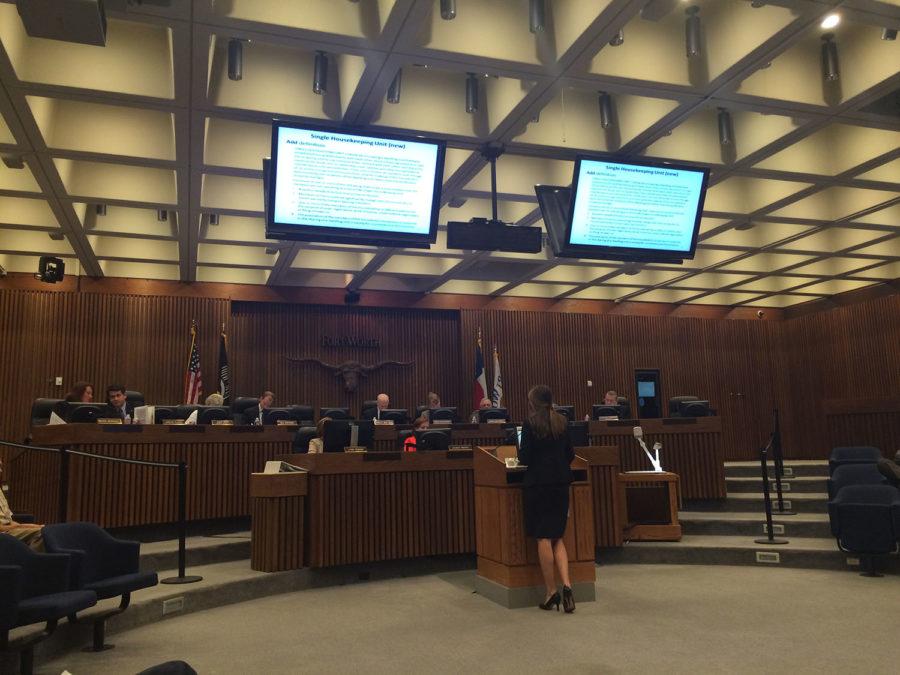Four requirements that could have limited students’ off-campus housing were left out of an amendment approved by the Zoning Commission Wednesday. The Zoning Commission voted to approve an amendment of housing definitions to the City of Fort Worth Zoning Ordinance during their meeting Wednesday afternoon. The amendment included a new definition for the term “single housekeeping unit” as well as several other revised or new housing definitions. The commission approved a definition for “single housekeeping unit” which included a descriptive paragraph regarding individuals who share a single lease agreement or own a property together and have “established ties and familiarity with each other,” according to the amendment. They did not approve the four presumptions proposed along with the description which, if true for any resident, would have implied the house wasn’t functioning as a single housekeeping unit and make the resident unable to own or rent a house. The presumptions included a restriction on locks or deadbolts on any interior doors of the house, significant changes in number of residents over a 12-month period and members using a different address for legal registration. Also, sharing the house couldn’t be for temporary, seasonal, convenient or economic reasons. There were three potential options for how to proceed with the “single housekeeping unit” definition, said Dana Burghdoff, executive secretary of the Zoning Commission and assistant director of Planning and Development. The first option was to not add a definition at all. The second was to add the single descriptive paragraph as the definition, and the third was to add the paragraph including one or more of the four presumptions. The Zoning Commission voted in unanimous approval of the second option, which did not include the four presumptions. “I think it’s better government on our part to tell people what the criteria [of ‘single housekeeping unit’] is,” commission member and Vice Chair Charles Edmonds Jr., said. “I don’t think we should be doing it on a case-by-case basis.” “I don’t think we can digest these other four criteria,” he said. “Based on my knowledge of how the city operates, and how code enforcement operates, I see no way of enforcing those.” How to define “single housekeeping unit” has caused the most amount of comments and concern, Burghdoff said. The city’s legal department wrote the proposed definition. “Single housekeeping unit” is a term found in the definition for “family,” another definition revised in the amendment. The term “family” applies to groups who live in all the types of residential areas in Fort Worth, Burghdoff said. The vote took place after two hours of passionate debate by community members. All three options were shown vehement support and opposition by representatives of neighborhood associations, landlords, realtors and other Fort Worth residents. Student Body President Maddie Reddick and four other TCU students were also present at the meeting. Reddick said the presumptions were “very concerning” to students and cited an online petition with over 1,800 signatures against them. Reddick said the presumptions would affect students, as most students don’t change their address for legal registration, are in Fort Worth seasonally for the school year and live with roommates for economic purposes. “I think it’s very apparent that TCU students are willing to work with the city,” Reddick said. “We’ve been working on a Good Neighbor program over the past year … and we want this relationship to continue to be stronger as we continue with Fort Worth.” Several Zoning Commission members expressed their support for the second option for the “single housekeeping unit” definition. “Clarity in definitions, I think, is extremely essential in this exercise,” commission member Carlos Flores said. “The ground rules, so to speak, need to be defined better.” He said the definitions weren’t trying to “single out” any specific population in the community, but were necessary for the city staff, students and other community members to rely on in the future. Flores said the four presumptions were well-intended, but could be problematic in the future and introduce unintended consequences. “I think [the second option] best represents a solution that most everyone can live with,” he said. Commission member Melissa McDougall also said she supported the second option. She said she was looking at the decision from multiple perspectives, including as a mother with a son who’s renting a home. “I think option two is a good median for all of us, and this is for all across Fort Worth,” McDougall said. The Zoning Commission’s recommendation will go to the City Council, which will vote on the amendment on Oct. 13.
Categories:
Zoning Committee’s recommendation doesn’t threaten off-campus housing
Published Sep 10, 2015
Student Body President Maddie Reddick advocates for students in front of the Zoning Commission during the meeting Sept. 7.




